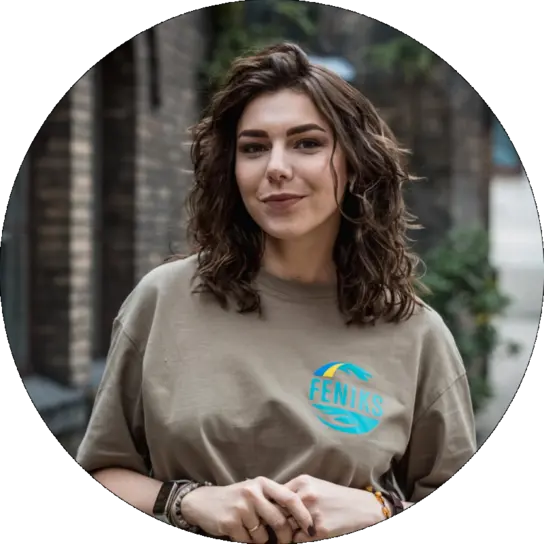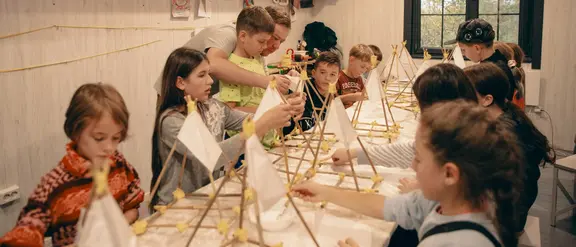Ukraine: Psychologist Nadiia Lokot on trauma work
With each passing day of the war in Ukraine, the psychological strain on children and families increases. Shelling and air raids, family separations and displacement have become a part of life for many. Almost half of all children show signs of psychological injuries and trauma.
Terre des Hommes partner organization, Libereco – Partnership for Human Rights, provides trauma support and psychosocial assistance to children, adolescents, and families in various regions of Ukraine. Nadiia Lokot works as a psychologist and project coordinator for Terre des Hommes , which implements psychosocial support projects for children, adolescents, and families in Ukraine. Since 2019, Nadi has primarily worked with victims of violence. In this interview, she explains the organization's approach and how it can help the many affected children and adolescents.
Nadiia, even after years of war: you provide psychological support in a continuing state of emergency. Where do you begin, what does your work entail?
Our primary goal is to help children, young people, and families, especially those directly affected by the war and forced to leave their homes. We also support caregivers and educators who work with children.
We offer direct psychological and psychosocial support, but our main focus is on teaching simple, effective methods for self-help and increasing resilience. We teach people how to cope with their situations. And we train them to pass these methods on, so that, for example, parents can continue to help their children in the future.

"At the moment, because of the war, it's very difficult for me to name a specific profession. But I am a psychologist, a trauma therapist, and I specialize, among other things, in crisis situations."
What does psychological support look like, especially for children?
When we talk about working with children, it's often not just about individual work, but also group work or mobile ad-hoc support – for example, through trauma-informed play or art therapy courses. For this, we have mobile teams of helpers who travel directly to cities and villages in Kharkiv, Donetsk, and Dnipro. We also run winter and summer camps.
A trauma support event usually begins with us posting an announcement on social media, sometimes in collaboration with a local partner organization. We then review the applications, prioritizing, for example, internally displaced people in the area or children separated from their parents. Afterwards, we try to stay in touch with the local contacts. They can, for example, participate in online courses.
Why is this form of mobile therapy helpful? Especially in the vulnerable regions near the front lines?
People who stay near the front lines with children often do so because they have no other choice. Some have physical disabilities. Sometimes they are simply large families with no other means of income. Apart from sporadic humanitarian aid, which is infrequent due to the broken roads and high risks, these people receive no other form of support.
I remember a comparison from one of our mobile helpers: When they conduct a game or an event with children, they do so so that these children can preserve this beautiful memory and later call upon their "patron saint".
You know Harry Potter? A Patronus is a kind of guardian spirit that can be summoned when you remember something good, despite the bad things around you. So if a child has this memory, a moment when they could simply be a child, without problems to solve, without fear of anything, when they could simply play, then that is priceless.
In this context, how would you explain the approach of your trauma therapy?
Trauma itself is very difficult to define. Essentially, it's the imprint of an overwhelming experience in which someone received no support. A trauma is like a splinter or a piece of glass left behind after an event that's already over. It's something painful that prevents you from living a fulfilling life here and now because something hurt you back then.
Especially in cases of war trauma, the core issue is the loss of control. We help people overcome these situations by using somatic practices and a body-centered approach. This can be a long process. We support individuals in regaining control and understanding their own bodies. All of this is based on a thorough understanding of the nervous system.
We often use trauma-informed training and play. Support, especially for children, can consist of simple, varied activities – starting with drawing, followed by a more active exercise. Eventually, the activities alternate. Children who have experienced occupation or shelling sometimes find themselves in a kind of emotional "numbness." Our approach helps to gently guide them out of this state.
Is there a particular case that has stuck in your mind?
I have so many of them right now. I remember, for example, a girl from Mariupol. It's impossible to live there anymore. And she moved to Dnipro, which is also very dangerous.
She participated in one of the holiday camps we ran as part of a previous project. She was in a very sad state of mind. Initially, she wasn't really interested in the camp. I think her mother suggested it. She agreed, but without much enthusiasm.
What she had experienced before is unimaginable. She had – and I know this is terrible to say – clearly lost the will to live. But after a few days at camp, she was smiling again, laughing with other children, and, in a way, finding her way back to life. She made friends and went on short hikes near the camp.
Perhaps this isn't a grand, fantastical story, but in moments like these, I see time and again that there is hope. It shouldn't even be possible for children to have to find their way back to life. Children should be children. Their only job is to grow, to be happy, to draw pictures, maybe to buy a bread roll at the store. They go through terrible things that are hard to bear even for adults. And when they find their way back to life, it's an incredible event for me.
When we talk about childhood in Ukraine as a whole: Is there anything that unites everyone in the experience of war?
Perhaps the most pervasive feeling is one of loss of security, especially for children. It's the loss of parents, the loss of home, the loss of stability. The experience of not knowing what tomorrow will bring, of not being able to rely on the future.
One might argue that no child plans their future far in advance. But there's a difference between being afraid that you could be killed tomorrow and being afraid that you might die tomorrow. When we [as an organization] plan our next day, for example, we're aware that one of us could die. And that's not exaggerated worry, it's reality. Because I'm here, in my country, there's a war going on, and the only way I can help is by providing support. But unfortunately, I can't stop missiles. And this constant feeling of insecurity and danger that completely surrounds us affects practically everyone.
It has now been eleven years since Russia occupied Crimea; three years since it launched its attacks on the whole of Ukraine. How are children, in particular, reacting to the ongoing reality of war?
As far as can be foreseen, the war unfortunately shows no signs of ending. The tension remains. This expectation that it will all be over in a moment and we will breathe a sigh of relief... The realization is growing that this will not happen. There will be no immediate peace, and no one can restore the joy of those who have lost loved ones, their homes, or their hope. All the more reason, then, to develop resilience and prepare ourselves.
Children suffer from the length of the war because they are more vulnerable to this constant feeling of danger. At the same time, however, they are more flexible in the face of change and can adapt. Children's psyches are very flexible. And that is an incredibly important gift.
If we don't abandon them, if we support them, if we give them security, give them a little childhood, and help them understand that this isn't forever... Perhaps I, too, won't live to see the end of the war, although I truly wish I would, but the children will definitely live. They are the future. Today's children will be the ones who one day rebuild everything.
As a psychologist, what is your view on the future of Ukraine?
[Thinks] "We'll all be traumatized." "We'll all have PTSD [Post-Traumatic Stress Disorder]." I don't like statements like that at all. When we talk like that, we're kind of programming ourselves for it. As if we're folding our arms and saying, "Well, we're all going to be in that state."
I am confident. That we can adapt if we continue the fight and if we keep responding to the existing challenges. I have hope. And even if this war doesn't end quickly, I am prepared to hold onto it because I want to live. I know that children are being born. I desperately want to have children too. In Ukraine.
Yes, healing will take time, removing the splinters will take time. But if we persevere and believe in what we are doing, it will get better sooner or later.
